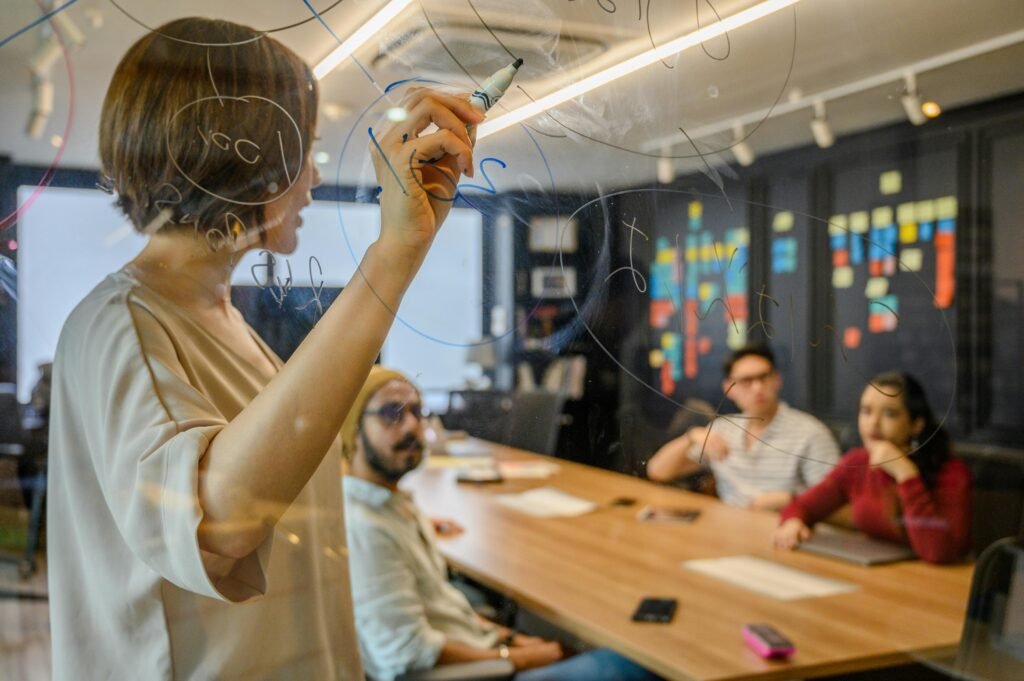The quest for impact-driven work is a rising priority across Southeast Asia.
A new report reveals that 98% of 2,023 Southeast Asian workers feel it’s important to find a sense of purpose through their careers. And, a company’s social responsibility reputation is a critical consideration for 77% of jobseekers.
This surging desire to align professional calling with personal values represents a significant cultural shift. The question is how can someone unfulfilled in their current role transition into impactful, values-aligned work?
Have an honest conversation with yourself

What do you consider to be impactful, purpose-driven work?
“Meaningful work means different things to different people,” Léa Klein, the Jobs That Makesense Asia Head and Makesense Asia Founder shares.
For some, meaningful work is about being in a role that has positive societal impacts, while for others it’s about having work-life balance so they’re able to pursue passion projects like publishing an eco-poetry collection or starting a social enterprise.
“It’s essential to understand yourself and identify where you would like to contribute the most,” Léa highlights.
As to how to go about this, Akashmegh Sharma, a Global Senior Associate at IDInsight created a sectoral framework that dissects this existential conundrum. Akashmegh used to work in finance before switching to a social impact career.
“Try to visualise where you want to be in 5 years. I suggest breaking down your goals into the following three categories: Professional, Personal, Educational,” he writes in a blog with visual aids and examples. “Once you have listed down these goals, make buckets of different possibilities and rank them in order of priority.”
For Angeli Recella, the Ikigai is also a useful framework—it’s exactly what an impactful, purposeful career means to her: “It’s the combination of what you are good at, what you can get paid fairly for, what can benefit society, and what you love to do.”
Angeli used to work across a number of functions for a tech startup, from human resources, research, down to product management. Today, she is the 3-year-strong Executive Director for Operations & Programs at Makesense Asia.
In part, she credits this successful transition to deep introspection.
“While you get to know more about the impact sector and the jobs that it offers, you have to have an honest conversation with yourself,” she shares. “Assess whether you are ready for the job and the transition it entails.”
Expand your understanding of the impact sector

How much do you truly know about the impact sector?
“One common misconception is that impact-driven roles are scarce and offer limited career growth opportunities… which is actually not accurate,” Léa says.
The impact sector has grown exponentially in the past decade. In Singapore alone, sustainability was among the top investment areas in 2022. Greentech investments soared to $259 million in 2022 from $29 million in 2021, while waste management investments spiked to $218 million from zero in 2021.
Impact-driven work opportunities are expected to grow even further, owing to climate urgency and global demands for sustainability. In fact, green job postings on LinkedIn far outpaced workers with the right skillset, the former growing twice as fast as the latter in the previous year.
To upskill, Bolun Li, the co-founder of Development Innovation Insider says to connect with the social impact departments of your current workplace. “Even if they are in a company from a traditional sector, they can already talk to their ESG department to help so that they can expose themselves in this circle as much as possible, rather than starting from scratch,” he shares.
If there’s no existing ESG or CSR department, another way of engaging with the impact sector is to volunteer or intern with an impact-led organization.
Léa talks about how she and her colleagues found their way into the industry: “Most of us pursued internships with these organizations, allowing us to gain a deeper understanding of the realities and skills required in this space.”
If time does not permit an internship or volunteering gig, it helps to join active, dynamic communities of practice such as The Bloom and Effective Altruism groups.
“The people in the impact sector are generally friendly and helpful. Ask them the questions you have in mind about the work that they do or the organization that they are in,” Angeli says.
Because of these entry points to the sector, Southeast Asian workers who transitioned to the impact sector have done so in various available methods: 44% switched to a completely new job or career field, 32% transitioned to different roles within the same company, 16% pursued independent paths such as freelancing or entrepreneurship, and 8% changed industries while retaining the same position.
Evidently, career opportunities are multiplying across nongovernment organizations, purpose-driven companies embracing ESG commitments, innovative green startups, and social enterprises. With generous work models like remote, hybrid and flexible hours also on the rise, geographical and time-bound barriers are crumbling. The possibilities for combining professional pursuits with positive impact are plenty.
“As an ecosystem, we have a responsibility to make these job opportunities and career growth prospects more visible,” Léa highlights. “Help more people realize that they can have a dynamic and rapidly growing career while contributing to a more sustainable and inclusive region.”
To that end, Jobs That Makesense Asia is a job search platform that curates hundreds of purposeful work opportunities across the Philippines, Thailand, Singapore, Malaysia, and Indonesia. Other impact-focused job boards are 80,000 Hours, UN Careers, and Freelancing For Good.
Don’t sleep on existing skills and experience

An internship, a bachelor’s degree, and a previous job experience all have one thing in common—they equip you with transferrable skills.
“Many people believe they lack the necessary experience, not realizing how valuable their previous skills are for impact organizations,” Léa takes notice.
Take stock of existing talents and showcase how they could apply to an impact organization’s needs. A marketing background could elevate awareness campaigns, while financial modeling skills could boost a startup’s fundraising.
“The impact sector also needs professionals in communications, project management, finance, technology, and more,” Léa shares. “There are opportunities for everyone, and the sector needs a diverse range of skills to thrive.”
During job interviews, illustrate concrete examples of how prior achievements in areas like operations, analytics, communications, or management could be invaluable assets for impact-led organizations.
“At the end of the day, I can only present what I can bring to the table,” Angeli shares, emphasizing the importance of authenticity in every step of the application process.
The purpose-driven future
Southeast Asia stands at the forefront of a regional renaissance redefining the role of work in catalyzing positive change and worthwhile lives.
By developing self-awareness and exploring the impact sector, while boldly asserting one’s own capabilities, Southeast Asia’s rising generation of changemakers can successfully embark on richly rewarding, purpose-driven careers.

